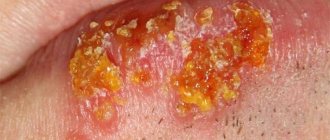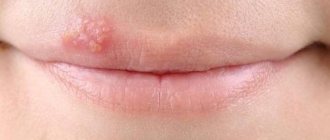All types of herpes, including “colds” on the lips, are caused by a parasitic virus that is firmly integrated into DNA nucleotides and remains in the female body for the rest of her life. During pregnancy, herpes attracts close attention from doctors, as it is a dangerous and difficult to control disease. Even simple herpes during pregnancy can cause abnormal development of the fetus. For example, herpes ranks second in terms of its teratogenic effect—the ability to lead to congenital deformities—second only to the rubella virus. Therefore, the presence of herpes in a woman during pregnancy is carefully examined and if the tests are positive, comprehensive treatment is carried out. What statistics say about this disease, how the virus is determined in the blood, and how it is treated during pregnancy is the main topic of the article.
Why does herpes appear on the lips during pregnancy?
Herpes is a viral infection that “lives” inside the lymph nodes and manifests itself in the form of thick, characteristic blisters on the mucous membranes and skin. There are many varieties of herpes. The most common: genital, labial (localized on the lips) and cytomegalovirus. This virus also causes Chickenpox.
The peculiarity of bearing a baby is that he is not only a carrier of his mother’s DNA, but also his father’s. And so that the female body does not perceive the embryo as a foreign object and does not start the process of rejection, the expectant mother is constantly in conditions of immunodeficiency. If a woman is already a carrier of the herpes virus, under such conditions it can easily become more active. But this is less dangerous than encountering the disease for the first time after conception.
If a woman enters pregnancy with antibodies to the disease already developed, the baby is practically protected from attack by viral cells for the entire 9 months. But if primary contact with the herpes pathogen occurs and the woman gets sick, this is extremely dangerous for the existence of the fetus. The virus quickly penetrates all tissues of the fetus and disrupts the normal rhythm of their development. And this process does not depend on the type of herpes: regardless of the location of the rash, the main concentration of pathogens is concentrated in the lymphatic system, which carries them throughout the body. Therefore, you should not think that herpes on the lip in the early stages of pregnancy has nothing to do with the child.
To protect yourself and your future pregnancy, it is very important to undergo TORCH screening at the planning stage, and twice during the process of bearing a baby.
Types of disease
Herpes is an infectious disease. Most often it appears on the skin, mucous membranes, and ocular cornea. Less commonly, the disease affects the nervous system and internal organs.
While waiting for the birth of a child, a woman's colds can affect not only her lips. The genital variety of herpes is often diagnosed - the disease appears in the intimate area on the labia during pregnancy.
Important! Treatment of herpes in the intimate area is different from treatment on the lips!
This is due to the fact that the disease exists in two varieties:
- the first type of virus is located on the upper part of the body - because of it, rashes appear on the lips;
- The second type of virus affects the lower half of the body - this manifests itself in the form of colitis, cystitis, genital ulcers, and anal fissures.
How the disease progresses:
- At the initial stage, itching appears, health worsens, and the temperature may rise.
- Then the lips swell and bubbles with liquid appear. As the disease progresses, the blisters open and small ulcers form instead.
- At the last stage, scabs form, skin sensitivity increases, and bleeding is possible.
The mechanism and routes of infection with herpes during pregnancy
Herpes is an intracellular nucleoprotein virus. It does not easily wander around the body, but immediately introduces its DNA into the proteins of neurons and becomes firmly established in the lymphatic system. Therefore, it is impossible to completely “kill” the infection. Treatment is limited to raising immunity, eliminating external vesicles (bubbles) and suppressing the synthesis of viral cells.
Herpes is transmitted by contact, through biological fluids, for example, saliva, semen, blood. Or directly upon contact with liquid that collects in bubbles. In everyday life, everyone comes into contact with this virus, but thanks to their strong immunity, most immediately begin to produce antibodies and may not even notice the hidden course of the acute phase of the disease. Under the influence of antibodies, the virus is in a state of sleep, but as soon as the immune system fails, for example, during acute respiratory infections, stress, pregnancy, it can become more active and appear on the skin in the form of a profuse rash.
Symptoms of herpes on the lips during pregnancy
During pregnancy, the clinical picture of the appearance of a “cold” on the lips has classic symptoms: a slight tingling, burning sensation is first noted on the lip or in the area under the nose, followed by itching, hyperemia, and redness. After 12-24 hours, vesicular rashes appear - vesicles of different sizes with sticky serous fluid.
The overall picture may include headache, weakness and fever.
When the liquid reaches its highest concentration, the bubble bursts and its contents pour out, spreading the viral infection in space. At this moment, a woman is most contagious to others. At the site of the burst vesicle, a weeping wound forms, which dries out over time and turns into a crust. After 8-10 days, the scab comes off on its own.
Primary infection with the herpes virus during gestation
Herpes is considered the most dangerous during pregnancy in the 1st trimester. But we are talking exclusively about the first contact with the virus, when there are no antibodies in the blood. In such conditions, both the woman and the baby are completely defenseless against the virus. Since any antiviral therapy is contraindicated before the 12th week of gestation, stopping the disease comes down to close monitoring of the development of the embryo, local treatment of herpes on the lip and the prescription of immunomodulators based on natural interferon. If a woman’s immune system is unable to overcome the virus, the pregnancy may end prematurely as a result of embryonic death or miscarriage.
In case of primary infection in the second trimester, treatment with strong antiviral agents is already allowed, so the outcome of the disease is more favorable for the mother and fetus. But herpes during pregnancy in the 3rd trimester, even with treatment, often leads to severe damage to internal organs (liver, kidneys, intestines, spleen).
Without special laboratory tests, it is quite difficult to distinguish a primary infection from a relapse of an existing disease. To do this, an analysis must be done to quantify antibodies (Ig) to each strain of the virus separately. If the result showed the presence of immunoglobulin Ig M (an active process without antibodies) and the absence of Ig G (the presence of antibodies and a latent course), this is bad. This means that the woman recently became infected with the virus and is now sick.
With these screening results, the spouse is examined, since he will also be infected. Treatment is carried out on both partners at once to prevent relapse.
Complications
Complications of labial herpesvirus include expansion of the affected area beyond the nasolabial triangle, damage to the mucous membranes of the mouth and nose. With primary infection during pregnancy, damage to the oral mucosa is possible, followed by the development of herpetic gingivostomatitis.
In addition, complications during pregnancy include frequent recurrent herpes, which appeared even before conception and recurs more than 10 times a year. Recurrent herpes negatively affects the quality of life of a pregnant woman, but is practically not dangerous for the unborn child.
Complications of labial herpesvirus include expansion of the affected area beyond the nasolabial triangle, damage to the mucous membranes of the mouth and nose.
Herpes during pregnancy: consequences
The peculiarities of herpes during pregnancy have been carefully studied by doctors for a long time. By this time, obstetricians-gynecologists already have an impressive arsenal of knowledge about the nature of this virus and treatment methods during gestation.
If you believe the hard numbers, the following conclusions can be drawn regarding the virus:
- More than half of humanity are carriers of this virus, and most do not even know it. By the time of puberty, 98% of the population is infected with the simple herpes virus.
- Primary infection with the virus can lead to intrauterine infection of the fetus in 50% of cases; in case of relapse, this figure is only 3%.
- If the virus first enters the body in the first weeks of gestation, the risk of miscarriage is 30%. When encountering herpes in the 2-3 trimester, the risk of late miscarriage is about 50%.
- Surviving children, after suffering intrauterine infection, become carriers of the latent form of the virus. At the same time, all kinds of dysfunctions of the body against the background of the disease can manifest themselves at a more mature age. The number of such children from the total number is 40%.
- If herpes occurs in a mild or asymptomatic form without adequate treatment, about 70% of children are born infected. Mortality after birth reaches 60%. Only 15% of babies are born completely healthy.
- The least dangerous infection with herpes is during pregnancy in the 2nd trimester. During this period, you can easily suppress the disease with the help of drugs that are incompatible with pregnancy in earlier stages.
- The most severe consequences of the virus include: miscarriage, gross malformations of organs and the nervous system, and perinatal mortality.
Not all types of virus need to be treated, and not all are dangerous for a pregnant woman. Only primary infection of a woman with any strain of the virus or an acute exacerbation of the disease requires surgical treatment. The disease in a latent state requires only monitoring the woman’s condition, since antibodies serve as a guarantee of the baby’s safety.
But how justified are such statistical assumptions regarding “colds” on the lips and is this herpes dangerous during pregnancy?
It turns out that only genital and herpes zoster in the primary form are considered the most dangerous during pregnancy. The herpes simplex virus, which appears on the face, mainly multiplies directly in the upper layers of the epidermis and rarely invades its viral DNA further than the spinal cord. Such local residence minimizes contact of herpes with the embryo. In addition, all outbreaks of herpes on the lips are recurrent in 72%, which indicates the presence of immunity to the disease.
It is very difficult for herpes simplex to get into the abdominal cavity on its own, and even more so into the amniotic waters of the uterus, so it quietly multiplies in the tissues of the skin and facial nerves, without disturbing the baby in the womb.
But the risk should not be completely eliminated. There are separate options for the development of the disease during primary infection, when viral particles can affect pregnancy. For example:
- Immunodeficiency state of the expectant mother. Problems with the immune system open the door for herpes to completely spread throughout the body without restrictions. If there are no antibodies and the immune response is unable to contain the virus, there is a threat to both the fetus and the life of the woman.
- Transfer of infection to a woman’s genitals through sexual contact. A woman can infect her partner’s genitals, and he, in turn, will transfer viral particles to her genitals. This way the virus can enter the uterus.
- Particular care should be taken if herpes on the lips appeared before childbirth. After birth, the mother can infect the baby while caring for him. During the entire period of illness, you should avoid contact of lips with the baby and wash your hands regularly.
What is the danger?
There are two types of simple herpes virus: HSV-1, which causes rashes on the face and lips, and HSV-2, which is genital. Many people believe that type 1 herpes does not pose a danger to the fetus and does not disrupt the course of pregnancy. However:
- During the initial episode, there is a risk of the virus spreading throughout the body. This is due to the fact that the body has not yet developed antibodies to fight it.
- In immunodeficiency states, for example, if a woman suffers from a cold during pregnancy, the possibility of infection of the fetus cannot be ruled out even with a recurrent form of herpes.
- Herpes can be transferred from the lips to the genitals of the expectant mother, and as a result, genital herpes develops.
It is worth noting that recurrent (secondary) herpes only in isolated cases causes infection of the fetus. A woman’s body already contains antibodies that protect the child from infectious agents.
The greatest danger during pregnancy is HSV-2, which can infect the fetus, cause involuntary miscarriage, and cause developmental abnormalities. In particular, this applies to primary infection, that is, when infection with a herpes virus occurred directly during pregnancy. Infection is especially dangerous in the 1st and 3rd trimesters:
- In the 1st trimester, especially before the 10th week, there is a high probability of fetal death and miscarriage. If pregnancy continues, congenital anomalies may develop, and as a result, severe disability.
- Infection in the last trimester, especially after the 36th week of pregnancy, can cause severe damage to the baby’s organs.
To determine the nature of infection (primary or secondary), a woman is tested for the presence of antibodies to the virus. If they are not detected, a primary episode of herpes has occurred.
As we see, the herpes virus, especially its primary episode, can have very serious, sometimes fatal consequences for the fetus. Therefore, at the first manifestations of the disease, a woman should immediately consult a doctor.
Treatment of herpes during pregnancy
Treatment of herpes on the lips during pregnancy does not involve taking antiviral pills. Doctors prescribe only ointments for external use to relieve unpleasant symptoms and speed up scarring of the vesicle.
In parallel with drug treatment, the woman is advised to maintain a strict hygiene regime, especially when in contact with the eyes and genitals. The diet is also adjusted to increase the amount of fruits, legumes, seafood and vegetables. At the same time, carbohydrates and sweets are excluded as much as possible. During treatment, it is forbidden to peel off the crust from the wound to avoid the addition of another infection. And after recovery, it is recommended to change your toothbrush.
There are many effective drugs among pharmaceuticals, but the doctor decides how to treat herpes during pregnancy.
Dermatological ointments with an antiviral effect based on the substance aciclovir are prescribed as external remedies for herpes during gestation. They can be used at any stage of gestation up to 8 times a day. Among these drugs are the following:
- Acyclovir (India).
- Zovirax (UK).
- Agerp (Ukraine).
- Acivir (Cyprus).
- Virolex (Slovenia).
- Herpetad (Germany).
To quickly heal the skin, you can use a liquid solution of tocopherol (Vit. E) or the vitamin preparation Aevit.
To locally enhance immunity, oxolinic ointment and interferon solution are prescribed. You can take homeopathic tinctures (eleutherococcus, echinacea) or vitamin complexes for pregnant women orally.
Oral administration of antiviral drugs is indicated only in more severe cases and is possible in late pregnancy.
If the manifestation of blisters on the lip is mild and is not accompanied by pain and itching, you can only get by with folk remedies:
- Propolis tincture (the vesicle should be cauterized).
- Calendula ointment (softens the crust).
- Grated raw potatoes (dries out the bubble).
- Tea, fir oil, aloe juice (accelerate skin regeneration).
- Toothpaste (accelerates vesicle breakthrough).
How to treat herpes
Some medications have side effects that can harm the child. To avoid this, a pregnant woman needs to treat herpes on the lip only with the means prescribed by the doctor, taking into account her position. Among modern drugs there are drugs that are approved for use during pregnancy. These include antiviral ointments and some immunostimulating agents.
Antiviral drugs - is it possible or not?
For herpes on the lips, doctors prescribe antiviral drugs. In the case of pregnancy, you will need to take into account that any substances that enter the mother’s body affect the fetus. Medicines tend to have negative side effects. In this regard, treatment of herpes on the lips during pregnancy is carried out only with ointments based on acyclovir. These products are effective, and their active ingredients do not penetrate the circulatory system.
The use of general antiviral drugs is prohibited. This is especially true for women in the first trimester of pregnancy.
If such treatment becomes necessary, the doctor selects the medicine based on the clinical picture and taking into account all possible risks.
Other medications
The standard treatment program for herpes includes taking immunostimulating drugs. But before treating herpes in pregnant women using this method, it is worth considering that the unborn child is a foreign body for the body. Thus, strengthening the body's immune system may pose a risk of miscarriage. As a rule, the use of immunomodulators is prescribed by a doctor if the risk is minimal and treatment without these medications is impossible. This applies to situations where the infection has spread to other areas of the body. This can happen if you do not seek medical help in a timely manner.
In the case of pregnant women, doctors prefer herbal immunostimulating agents, for example, ginseng and echinacea.
If the use of immunostimulants is a controversial issue, and its solution depends on the clinical picture, then the use of the following drugs is prescribed in any situation:
- Vitamin E. It accelerates wound healing and also prevents relapses with regular use.
- Disinfectant medicines. Ulcers can be treated with hydrogen peroxide, iodine, brilliant green and calendula tincture.
Each person has their own characteristics and contraindications. Therefore, you should not self-medicate based on the examples of friends and acquaintances. At the first sign of herpes during pregnancy, consult your doctor.
How to safely relieve pain, itching and swelling
Folk remedies against herpes help relieve symptoms of illness and speed up the healing of ulcers. Pregnant women are interested in what to do with herpes in their situation and what methods can be used to eliminate pain in the wounds. The following methods are not dangerous:
- Rinsing the ulcer with a solution of salt or soda. These substances are completely safe for the mother’s body, since they are allowed for consumption. The soda-saline solution will dry, soften and disinfect damaged skin.
- Warming the wound with a hot spoon. To perform this procedure, you need to dip a clean spoon into hot tea, and after a few seconds, pull it out and apply it to the rash. Heat relieves pain, but should not be used if blisters with pus form.
- Applying an ice cube. Cold constricts blood vessels and affects nerve endings. This makes the local area of the lip skin less sensitive to pain. The method is contraindicated for pregnant women with allergies to cold.
- Lotions from tea bags. Regular tea leaves contain antioxidants and anti-inflammatory substances. If you often apply a wet tea bag to the herpes, you can improve the condition of the wound and prevent the inflammatory process.
Do not try to get rid of herpes on your own using infusions and decoctions. Although safe for a woman, they can have a negative effect on the fetus.
If you want to use a well-known and proven herbal remedy, be sure to consult your doctor. The doctor will determine the degree of risk for the child and, if necessary, select alternative treatment methods.
Herpes during pregnancy - reviews
In the first weeks of pregnancy, every second woman experiences herpes on her lip. Special ointments help solve this cosmetic defect in less than a week. The only complication from this disease that women note is excessive fear for the baby. This virus does not cause dangerous defects in the development of the baby if the woman does not have immunodeficiency diseases and has antibodies to herpes in her blood. Therefore, there should be no special worries in this regard if all the doctors’ recommendations are followed.
In order not to experience severe anxiety when herpes appears on the lips during pregnancy, it is better to undergo an examination in advance before conception. If it turns out that you are already a carrier of the virus, calmly become pregnant and do not be afraid of the consequences. In the absence of antibodies, try to limit yourself from contact with people who have a herpetic rash. And at the first suspicion of infection, immediately seek help from a gynecologist.
Folk remedies for treating the disease
Traditional medicine methods are quite effective in combating the virus if used at the initial stage of the disease. The most effective treatments using available products:
- Cauterization of inflammation - with tincture of propolis or calendula;
- Lubricating wounds on the lips with rosehip, sea buckthorn, bergamot, lavender oil;
- Using lemon balm-based creams;
- Apply aloe juice to the affected areas;
- Use toothpaste to dry the wounds;
- The chicken egg film is applied to the inflamed areas until completely dry.
However, the use of folk remedies does not negate a pregnant woman’s visit to the doctor. After all, these drugs only affect the symptoms of the disease, and not the virus.










